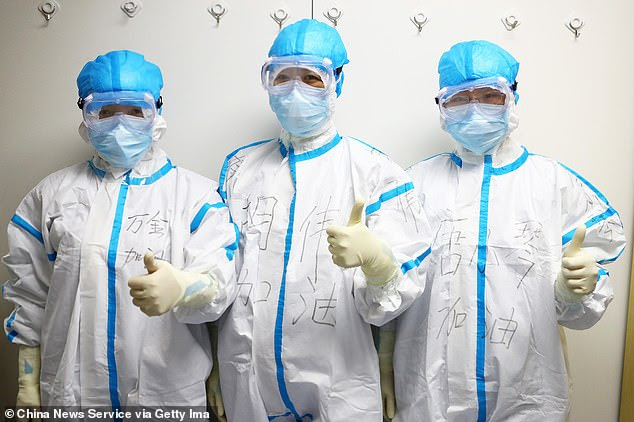- Tocilizumab, marketed as Actemra, is taken by patients with rheumatoid arthritis
- It reduces inflammation, which is considered a complication of COVID-19
- It causes lung damage and organ failure, eventually death in most cases
- Chinese doctors gave it to 20 patients during the peak of the countries epidemic
- Nineteen were discharged within 14 days despite being critically ill
- Actemra has now been approved for use in China and for trials in the US
- Coronavirus symptoms: what are they and should you see a doctor?
- By VANESSA CHALMERS HEALTH REPORTER FOR MAILONLINE
Tocilizumab, marketed as Actemra, is taken by patients with rheumatoid arthritis to lower inflammation.
The findings come as scientists worldwide urgently hunt for new ways to combat the deadly infection, which has so far affected almost 450,000 people and killed almost 20,000.
Chinese doctors gave it to 20 patients during the peak of the country’s epidemic, and claim 19 were discharged from hospital within two weeks.
Because tocilizumab is an existing drug, it could be fast tracked into experiments by regulators.
Health officials in China have since approved Actemra to treat coronavirus patients with serious lung damage as a result of high inflammation – the body’s response to the coronavirus.
It has already been green-lighted by the FDA for trials on patients in the US, it was revealed yesterday.
No patients in the UK are thought to have taken the drug yet, in trials or clinical care.

Tocilizumab is used to treat adults with rheumatoid arthritis, as well as certain types of childhood arthritis.
It is typically marketed under the names of RoActemra and Actemra, produced by the Swiss pharmaceutical firm Roche.
The prescription medicine works by reducing levels of IL-6 protein in the body, which people with rheumatoid arthritis or another autoimmune conditions have too much of
If there is too much IL-6, it can cause inflammation and damage. Tocilizumab blocks the effects, and has become a go-to for inflammatory disease treatment.
Doctors in China trialled tocilizumab to prevent an overreaction of the immune system seen in some coronavirus patients.
Called a ‘cytokine storm’, the body’s immune response can go into overdrive and produce inflammation.
The overreaction of the immune system is considered a major factor behind catastrophic organ failure and death in some coronavirus patients.
It’s not clear the extent to which the really severe pneumonia symptoms seen in critically ill COVID-19 patients are due to the virus, or complications with the body’s response.
Doctors in China were the first to try tocilizumab against the deadly coronavirus that causes COVID-19 in early February.
Patients, who were given routine therapies along with the drug, were diagnosed as severe or critical.
They were being treated at two separate hospitals in the eastern province of Anhui in China – The First Affiliated Hospital of University of Science and Technology of China and Anhui Fuyang Second People’s Hospital.

Within a few days, patients’ fever returned to normal and all other symptoms improved remarkably, Dr Xiaoling Xu and colleagues report.
Fifteen of the 20 patients involved in the trial were able to have their oxygen intake lowered, while one patient was taken off completely.
Seventeen of the patients had seen levels of their white blood cells, called lymphocytes, drop. But on the fifth day, this returned to normal in ten of the patients.
Nineteen patients (95 per cent) were discharged after 13 and a half days. The other patient is recovering well, the study said.
The authors concludes: ‘Tocilizumab is an effective treatment in severe patients of COVID-19, which provided a new therapeutic strategy for this fatal infectious disease.’
The researchers did not compare the drug to a placebo or any other drugs in the small study. The paper was published on ChinaXiv, a website which hosts scientific research which has not been peer-reviewed.
At the beginning of March, China’s National Health Commission published a treatment guideline that allows the tociluzumab to be used to treat coronavirus patients who have high IL-6 levels and who show serious lung damage.
Karsten Kleine, a spokesperson for Roche, told NBC News that the drug company ‘is in active discussions with the FDA, as well as government bodies and institutions around the world, to initiate clinical trials that evaluate the safety and efficacy of Actemra (tocilizumab) for the treatment of severely ill COVID-19 patients.’
The FDA announced yesterday that it would be The FDA had approved the initiation of a large trial if Actemra.
The phase III clinical trial launched by biotechnology company Genetech, will compare the drug to a placebo while with the combination of standard care for patients with severe COVID-19 pneumonia.
It will involve approximately 330 patients across the US and other countries who will be tracked for 60 days, with recruitment set to begin in early April.
Genentech also announced in a press release that the company is providing 10,000 vials of tocilizumab to the United States Strategic national stockpile for potential future use.
Alexander Hardy, chief executive officer of Genentech, said in the press release: ‘We thank the FDA for rapidly expediting the approval of this clinical trial to evaluate Actemra in critically ill patients suffering from pneumonia following coronavirus infection and we’re moving forward to enroll as quickly as possible.’
Research in China is ongoing – the country will test Actemra with a further 188 coronavirus patients in a study running until May 10.
There is no published clinical trial data on the drug’s safety or efficacy against the virus, Roche admitted.
MailOnline have contacted the MHRA for comment.

Leave a Reply